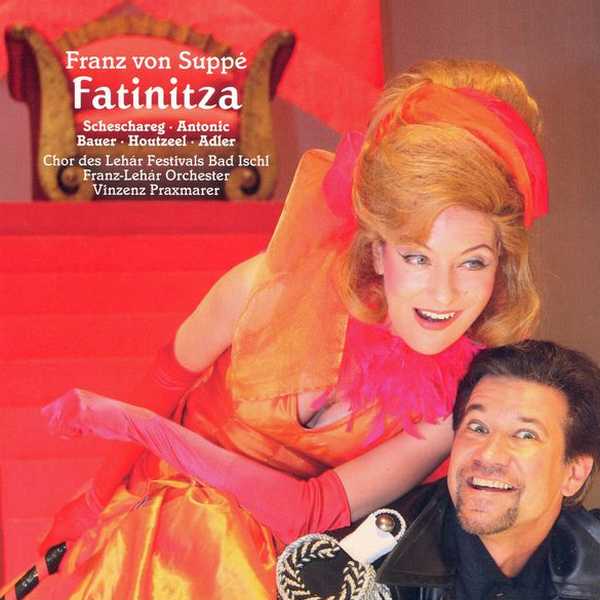
Composer: Franz von Suppé
Performer: Stephanie Houtzeel, Steven Scheschareg, Zora Antonic, Christian Bauer, Bernhard Adler, Chor des Lehár Festivals Bad Ischl
Orchestra: Franz-Lehár Orchester
Conductor: Vinzenz Praxmarer
Format: FLAC (tracks)
Label: CPO
Catalogue: 777202-2
Release: 2007
Size: 610 MB
Recovery: +3%
Scan: cover
Fatinitza
CD 01
Act I
01. Preludio
02. Introduction. Halt, wer da? (Watchers)
03. Dialogue: Ha, ha, ha! Hurrah! (All Cadets)
04. Entrance of Marketenders: Wutki, wenn die Flasche leer! (Wuika)
05. Dialogue: Dimitri Fedorowitsch! Drei Tage Barackenarrest (Ossip)
06. Dreamsong: Erwache frei von allem Kummer (Cadets, Chorus)
07. Dialogue: Du hast getraumt? (Steipann)
08. Reporter’s Song. Was gibt’s da? (Wladimir)
09. Dialogue: Pardon, Herr von Golz (Ossip)
10. Departure of Cadets: Aber deswegen niemals verlegen (Julian)
11. Dialogue: Ich soll die Rollen herausschreiben (Steipann)
12. Entrance of Generals: Himmel, Bomben, Element! (Kantschukoff)
13. Dialogue: Boze! Og Gott! Allah, sei uns gnadig! (Steipann)
14. Duet. Wollen Sie mich lieben (Wladimir, Kantschukoff)
15. Dialogue: So will ich zum ersten Male in meinem Leben (Kantschukoff)
16. March: Liegt der Schnee so weiss (Chorus)
17. Dialogue: Jetzt ist es hochste Zeit, dass Fatinitza verschwindet (Wladimir)
18. Aria. Eurer Onkel (Lydia)
19. Quartet: Eine Zuflucht winket Dir (Kantschukoff, Lydia, Wladimir, Julian)
20. Dialogue: Links, rechts, links, rechts! (Kantschukoff)
21. Finale. Nur kein Geschrei (Chorus)
Act II
22. Toilette Chorus. Den Gebieter zu entzucken (4 Solos, Sklavinnen)
23. Dialogue: Schnell Schnell! Seine Hoheit kommt! (Mustapha)
24. Couplet: Reformen tun Not bei der turkischen Nation (Izzet)
25. Dialogue: Effendi, Hassan-Bey! Er bringt die Christinnen (Mustapha)
26. Melodrama: Kurzer Musiksatz
27. Dialogue: Ever Hoheit! Hier sind die beiden Christinnen (Hassan)
28. Izzet’s Departure: Ein bissel auffrischen (Izzet, Nursidah, Besika, Diona, Suleika)
CD 02
01. Duet. Mein Herz, es zogt (Wladimir, Lydia)
02. Dialogue: Kommt Schwestern, totet die Christin (Women)
03. Sextett: Bin ich selbst (Wladimir, Lydia, Nursidah, Besika, Zuleika, Diona)
04. Dialogue: Lasst die russischen Parlamentarier hier eintreten (Mustapha)
05. Kismet Duet. Jeder Trinker ist anfangs nuchtern (Izzet, Julian)
06. Dialogue: Ach, wie schade, Pascha (Julian)
07. Glocken Sextett: Silberglockchen rufen helle (Nursidah, Julian, Izzet, Diona, Zuleika, Besika)
08. Dialogue: Das Fest, das Ever Hoheit anbefohlen, ist bereit (Mustapha)
09. Finale. Und num zum Karagois! (Izzet)
10. Fatinitza March
Act III
11. Glocken Aria. Glockentone kunden Frieden (Lydia)
12. Dialogue: Ein Gast, ein Gast (Steipann)
13. Duet. Um Fatinitza’s Spur zu finden (Julian, Kantschukoff)
14. Dialogue: Fatinitza scheint wirklich stark begehrt zu sein! (Julian)
15. Trio. Dich wieder zu seh’n (Wladimir, Lydia, Julian)
16. Dialogue: Wladimir, Junge (Julian)
17. Finale. Willkommen! Hier steht die Braut (Kantschukoff)
Fatinitza, an operetta in three acts, based on La Circasienne of Eugène Scribe, set by Auber, has a text by Zell and Genée, two of the most distinguished collaborators in the genre of operetta. Set in the Crimean War, it deals with the mistakes that occur when Lieutenant Wladimir adopts female disguise, captivating the General Kantschukoff and later finding himself imprisoned in a Turkish harem. It was first staged at the Carltheater in 1876.
Operetta is by its very nature socially irresponsible and politically incorrect. Few operettas are more socially irresponsible than Franz von Suppé’s 1876 effort Fatinitza; a coarse, high-kicking, cross-dressing opus set smack dab in the grinding horrors of the Crimean War. Vladimir is a Russian lieutenant with a touch of Ed Wood in his soul, dressing up as Fatinitza and winning the passionate, undying devotion of General Kantschukoff. In his male identity, Vladimir is likewise taken with the General’s daughter Lydia. When Lydia is whisked off by the Turks, Fatinitza poses as her maid in order to remain close to her. The truth comes out as Lydia is inducted into a Turkish harem, and with the help of Vladimir’s friend Julian, Lydia’s freedom is achieved. At war’s end, poor foolish General Kantschukoff is still seeking Fatinitza, and Vladimir introduces himself as Fatinitza’s sister, explaining that she has died. Although the General is crushed by the news, he allows Vladimir to marry Lydia. This work remained popular from the time of its premiere until the outbreak of the First World War; the horrors of that conflict had a tendency to erase the appeal of works like these, and between 1917 and 2006 Fatinitza was revived only twice. This CPO recording, Franz von Suppé: Fatinitza, is taken from the second post-WWI revival, a 2006 production from the Lehár Festival in Bad Ischl.
The role of Vladimir/Fatinitza is a “pants” role, traditionally played by a woman, and in this production the part is portrayed by mezzo-soprano Stephanie Houtzeel. She and the rest of the cast are very strong, the orchestral playing is high spirited and crisp, and the recording, while a little distant, is clear and brings the singers into a good perspective with the rest. For English speakers, CPO’s booklet presents a problem; while an English-language summary of the story is provided, there is no libretto of any kind, not even in German. What’s more is that this is a complete performance and so there is a fair amount of dialogue involved. If neither of these aspects of the presentation prove a barrier to enjoying this performance, then CPO’s Franz von Suppé: Fatinitza should satisfy; certainly there is no other recording of this guiltiest of guilty pleasures.



